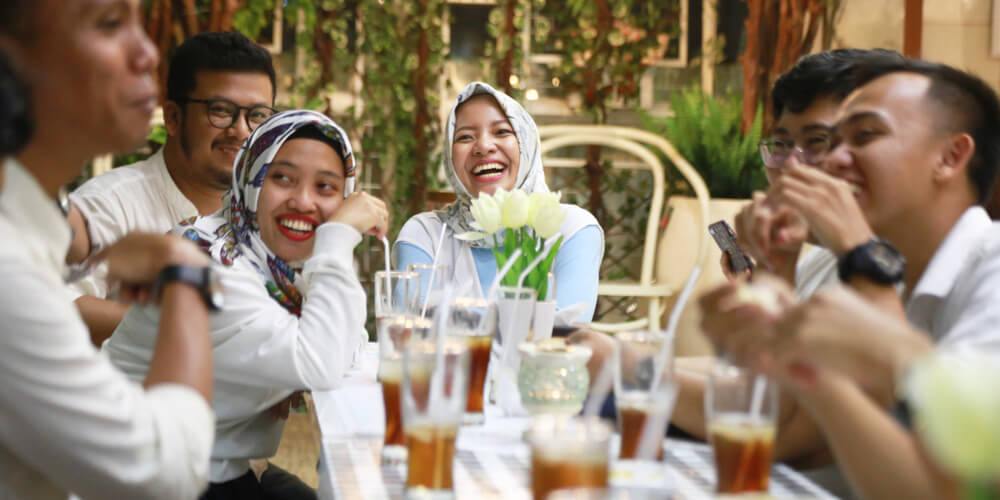Indonesian halal restaurants anticipate a 30% hike in demand during Ramadan
Demand spikes as the world slowly emerges from the COVID-19 pandemic that severely limited restaurants’ ability to operate, but also encouraged consumers to change their food choices and operators their business models.
Jakarta: Indonesian halal restaurant operators expect a minimum 30% increase in demand over Ramadan compared to the rest of the year.
R. Muhammad Suherman, chairperson of Indonesia Halal Chef Association, told Salaam Gateway that, throughout the global COVID-19 pandemic, consumer behaviour had shifted whereby healthier and halal food are now top-of-mind.
“In a normal month, demand fell from 80% to 50% depending on the government's social restriction policy, but we have seen a consistent pick-up during Ramadan in the last two years – around 30%,” he said, adding restaurant operators had also changed their business models to accommodate the constraints.
He said operators had introduced creative initiatives to fill their capacity losses. These included home-through services, collaboration with ride-hailing partners (Gofood, Grabfood, Shopeefood) and implementing cloud, ghost or shared kitchens to reduce operational costs.
“There are still consumers too cautious to leave their houses and concerned about COVID-19 spread. With this niche market, restaurant operators are already familiar with providing services directly to their homes; just like the catering package, but with smaller quantities that used to be a minimum 50 people and now reduced even to individually or in twos,” Suherman added.
Digitalisation has assisted operators in terms of efficiency. A cloud kitchen, a shared facility held by a provider, cuts production costs. For example the provider covers halal permits or licenses.
However, as with every element of the food and beverage industry, halal restaurants are linked to the tourism industry – an economic arena significantly slashed by the pandemic. Suherman said this has underpinned operators in adjusting their business models.
“Since the pandemic, most restaurant activities, especially dine-on-the-spot, are sub-optimal. Given the government implemented limited capacity and operational hour regulations, many things reduced like takjil-sharing and chefs,” he said indicating operators are balancing their online and offline sales and focusing on local consumers.
A shift towards healthier and holier food and beverage
The annual NeuroSensum survey reflects operators’ expectations also meet the consumer plan. The report Ramadan Consumer Insight, carried out between 25 February and 5 March, surveyed 1,500 Indonesian consumers from key cities including greater Jakarta, Surabaya, Medan and Bandung, indicating 57% are spending more this Ramadan than last year.
Consumers claim they will spend an average 6.9 million rupiah ($482.25) during this Ramadan or 10% more than in 2021. Since NeuroSensum began tracking the data in 2019, it can compare the 2022 Ramadan spend with pre-pandemic data; then around 6.8 million rupiah ($475.31).
“It is interesting to see Ramadan spending is returning to pre-pandemic level. Things look positive during this Ramadan; people will spend more … (many) companies have said they will also give Eid Fitr bonuses and release more budget,” Rajiv Lamba, NeuroSensum founder, told participants during a Zoom meeting in mid March.
Around 43% said they were currently planning their Ramadan shopping with food and beverage among the top categories. Equally 47% said they were boosting their at-home food and beverage consumption compared to last year.
Consumers also planned to shift from unhealthy or unholy food, especially alcoholic beverages, fries and carbonated or sugary beverages, toward healthier choices namely fruits, vegetables, vitamins or supplements, meat (chicken or fish) and liquid milk.
The preference for online purchasing continued with 60% of consumers indicating they would increase internet spending at the expense of physical shops. The survey also reflected, during Ramadan, consumers preferred brands with good business practices and those giving back to the community.
Adding new outlets
Adit Adityawarman, Managing Director of Dapur Aroma Nusantara, a Jakarta-headquartered business specialising in noodle restaurants under the Bakmitopia brand, told Salaam Gateway the company will open four new restaurants during Ramadan 1443 hijri in anticipation of the escalated demand.
Adityawarman currently runs 43 restaurants in Jabodetabek or greater Jakarta and has a central kitchen to maintain food quality and nutrition standards with capacity for 80 restaurants.
It also secured halal certification from the Indonesia halal product assurance organising agency BPJPH in August last year.
“We commit to safeguarding consumers' rights … Many think the halal certificate is as simple as no pork or lard, but for us, it is a brand's long-term commitment to providing dishes confirmed as halalan toyyiban – from the use of ingredients to processing and serving. We also ensure the basic ingredients (are) guaranteed halal,” Adityawarman said.
He admitted surviving the pandemic had been “a bit challenging”. However, a noodle-based menu formulated in various Indonesian flavours was one of the attractions that had attracted repeat consumers.
Bakmitopia noodle flavours range from Aceh noodle to Medan noodle, Java-style boiled noodle and Tomyam noodle, now one of the champions and Bakmitopia’s best-selling menu.
Adityawarman said in addition to menu creativity, various promotions and social media activities also kept the brand close to fans throughout the pandemic. The brand is located in strategic stopover points and consumers range from students to professionals.
© SalaamGateway.com 2022. All Rights Reserved
